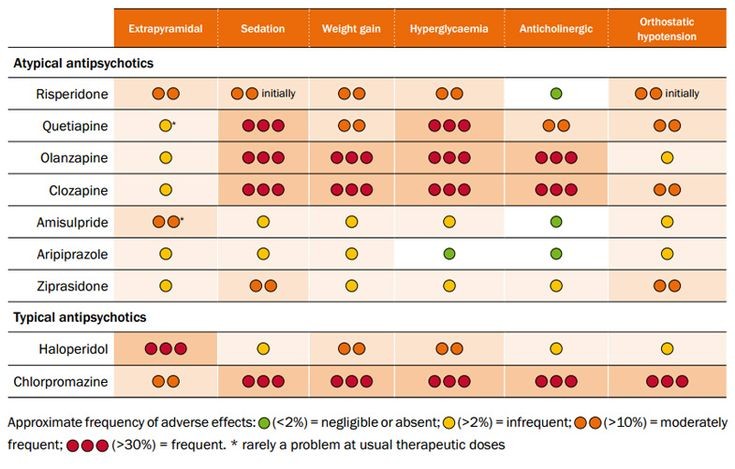
Contents
- 1 Haldol vs. Risperdal
Haldol vs. Risperdal
Haldol is an antipsychotic medication used to treat schizophrenia, acute psychosis, and Tourette’s syndrome. It works by blocking neurotransmitter receptors in the brain, specifically dopamine and serotonin type 2 receptors.
Risperdal is an atypical antipsychotic used to treat schizophrenia, bipolar mania, and autism. It affects the brain by interfering with communication among nerves, blocking several receptors including dopamine type 2, serotonin type 2, and alpha 2 adrenergic receptors.
QUESTION
What are the side effects of Haldol and Risperdal?
Haldol
The common side effects of Haldol include:
- extrapyramidal effects (involuntary motions, muscle stiffness, akathisia, Parkinsonism)
- dizziness
- hyperactivity
- tiredness
- nausea
Other important side effects include:
- sedation
- weight gain
- erectile dysfunction
- menstrual irregularities
- insomnia
- gynecomastia
- dry mouth
- vomiting
- constipation
Haldol may cause orthostatic hypotension (a drop in blood pressure) during the early phase of treatment. It may also cause abnormal heartbeats, seizures, blood cell count changes, and withdrawal symptoms. Elderly patients with dementia-related psychosis are at an increased risk of death when treated with antipsychotic drugs.
Risperdal
The commonly-noted side effects of Risperdal include:
- insomnia
- headache
- dizziness
- hyperactivity
- drowsiness
- abdominal pain
- fatigue
- fever
- nausea
Extrapyramidal effects (involuntary motions) may also occur. Risperdal may cause orthostatic hypotension during the early phase of treatment. Studies suggest an increased risk of hyperglycemia-related adverse reactions. It is important for patients to be tested for elevated blood sugars and diabetes symptoms.
What is the dosage for Haldol vs. Risperdal?
Haldol
- The recommended oral dose for schizophrenia is 0.5-5 mg two or three times daily up to a maximum dose of 30 mg daily. The lactate solution can be administered intramuscularly or intravenously.
- The recommended dose for treating Tourette’s syndrome is 0.5-5 mg orally two or three times daily.
Risperdal
Risperidone can be administered once or twice daily. The recommended dose for treating schizophrenia is generally 2-8 mg/day. In children above 13 years, the initial dose is 0.5 mg once daily, which can be increased to a recommended dose of 2.5 mg/day. Risperdal Consta is administered every two weeks. The recommended dose for bipolar mania is 2-6 mg/day.
Subscribe to MedicineNet’s Depression Newsletter
By clicking "Submit," I agree to the MedicineNet Terms and Conditions and Privacy Policy. I also agree to receive emails from MedicineNet and I understand that I may opt out of MedicineNet subscriptions at any time.
What drugs interact with Haldol and Risperdal?
Haldol
Haldol may cause increased sedation when taken with alcohol, benzodiazepines, or narcotic pain medications. It may also interact with tricyclic antidepressants and certain antihypertensive medications. Carbamazepine may decrease the effectiveness of Haldol, while rifampin may increase the risk of side effects.
Risperdal
Risperidone may interact with clozapine, causing increased levels of clozapine in the blood. It may also interact with serotonin reuptake inhibitors and antifungal drugs, potentially increasing the risk of adverse reactions.
Are Haldol and Risperdal safe to use while pregnant or breastfeeding?
Haldol
- Neonates exposed to antipsychotics during the 3rd trimester of pregnancy may develop withdrawal symptoms and extrapyramidal symptoms.
- Haldol is secreted into breast milk. It should not be used while breastfeeding.
Risperdal
- There are no adequate studies of risperidone in pregnant women. Some unwanted effects have been reported in animal studies. Risperidone can be used in pregnancy if the benefits outweigh the risks.
- Risperidone is excreted in human breast milk. Women receiving risperidone should not breastfeed.


